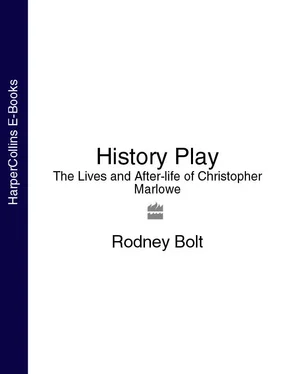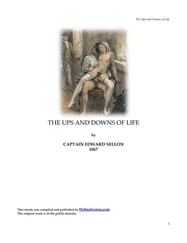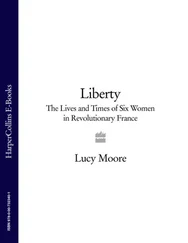( Dido, Queen of Carthage ii 1)
The boys re-enacted the scenes Oliver had witnessed, shouting Tue, tue tue ! (Kill, kill, kill!), a phrase which haunted Marlowe and was chillingly echoed in his version of The Massacre at Paris (c . 1590), and later also in the assassination of Coriolanus. Marlowe’s subsequent Puritanism also possibly springs from this time. Certainly, Oliver was to become a lifelong – at times it would seem his only – friend.
One event in 1573 was to brighten the boys’ lives considerably. In September, Elizabeth I arrived in Canterbury to celebrate her fortieth birthday. Christopher had never seen anything like it in his life. Perhaps this was the awakening of the taste for pomp and splendour and a fascination for England’s history that he would display in his early plays. Certainly, the royal visit gave him a tantalising glimpse of the world beyond St George’s. Royal progresses were awesomely extravagant combinations of ritual and spectacle, and this one was magnified not only by birthday celebrations, but by the arrival in Plymouth the month before of the adventurer Sir Francis Drake with tens of thousands of pounds’ worth of shiny plundered treasure. What pageantry, what feats, what shows, what minstrelsy and pretty din the people made in Canterbury to meet the Queen. The city had been preparing for months. The revelry would indeed be unprecedented, if the frantic activity of their neighbours in Sandwich (through which the Queen passed on the way) was anything to go by: here buildings had been repaired, ‘beautified and adorned with black and white’, the town had been gravelled and strewn with rushes and herbs, great bows put on doors and festoons of vines and flowers hung across the streets; the brewers had been enjoined to brew good ale for her coming, the butchers had to cart their offal out of town, and someone was employed especially to keep the hogs out. The Virgin Queen stayed in Canterbury for fourteen days, and would have passed close by the Marlowes’ house for the celebrations on the exact occasion of her birthday, 7 September. That day she was met by Archbishop Parker at the west door of the Cathedral, and before she had even dismounted from her horse heard a nervous Grammarian (a scholar from The King’s School) make his oration. As a member of the cathedral choir, Christopher would have had a fine view, as they ‘stood on either side of the church and brought her Majesty up with a square [solemn] song, she going under a canopy, borne by four of her temporal knights’. City officials were adorned in every bit of silk, velvet and ermine that their livery afforded, even the ordinary burghers were fitted with finery that amounted almost to fancy dress. There were lavish entertainments, masques and musicians, elaborate feasts, and a showering of Gloriana with sumptuous gifts. And there were players.
Christopher had seen players before. William Urry observes that there is a record of travelling troupes coming to Canterbury in almost every year of Marlowe’s boyhood. The Lord Warden’s Players, for example, came in 1569/70, and the city accounts for December 1574 record: ‘Item payd to the Lord of Leycester his players for playing.’ Perhaps, like his Gloucester contemporary R. Willis (the boy who had been the bedfellow of his teacher Master Downhale), Christopher had been taken by his father to see a morality play in the market place, standing ‘between his leggs, as he sate apon one of the benches’. For Willis, ‘[t]his sight tooke such impression in me, that when I came towards man’s estate, it was as fresh in my memory, as if I had seen it newly acted’. The pageantry and supposed idolatry of mediaeval mystery plays was disapproved of by stricter adherents of the Reformation, but an old Catholic pilgrimage town like Canterbury, one that a contemporary traveller noted was a ‘harborowe[r] of the Devill and the Pope’, still abandoned itself to such wickednesses as Maygames, bonfires in the streets and bell ringing on saints’ days, and may well have indulged itself in the odd performance of a miracle play.
But something was happening in the 1560s and 1570s that made the shows Christopher saw very different, more alluring than the old Mystery cycles, and perhaps even a little more wicked. Already in the first decades of Elizabeth’s reign, the tradition of religious and civic performances had begun to give way to troupes of strolling players who offered spicier fare. There was a move from morality to mirth, from the didactic to the entertaining. Theatre was becoming more fun. In London in 1567, the Red Lion, the first commercial playhouse with a paying audience, had opened. The amphitheatre-like design of the Red Lion playhouse, based itself on the buildings used for bear-baiting and other earthy entertainment, became the model for the Theatre, which opened in Shoreditch on one of the main roads leading out of London, three years after Queen Elizabeth’s visit to Canterbury (and, incidentally, lodged the word in English with its modern meaning). These new public playhouses offered ‘gallimaufreys’ – hotchpotches of romance and drama, narratives with ‘many a terrible monster made of broune paper’, amorous knights, acrobatics and knockabout clowns. These medleys, Philip Sidney’s ‘mungrell Tragycomedie’, catered to a new body of urban playgoers who were looking for something in between community religious drama and the stiffer plays performed in private homes and after banquets. Powerful men such as the Lord Chamberlain and the Earl of Leicester, Robert Dudley, began to sponsor the playhouses, as presenting the new drama at court became a sign of their status and standing with the Queen, with rival companies doing battle over who was chosen to perform the Christmas entertainments. At first, this was a London-based phenomenon and the provinces lagged behind, but go-ahead companies such as ‘the Lord of Leycester his players’ would have brought the drama that so captivated Christopher Marlowe to Canterbury.
What is more, Stephen Gosson was once again showing the way. He had begun to write plays. None has survived, but the author Francis Meres ranked him ‘the best for pastoral’, and Gosson himself mentions a tragedy, Cataline’s Conspiracy , a comedy, Captain Mario , and a moral play, Praise at Parting . According to Gosson, it was Cataline’s Conspiracy that Marlowe was first to see, when he was ten, in 1574 – the year that ‘diverse strange impressions of fire and smoke’ appeared in the night skies over Canterbury, and the heavens seemed to burn ‘marvellously ragingly’, with flames that rose from the horizon and met overhead, ‘and did double and roll in one another, as if it had been in a clear furnace’. It was a magnificent display of the aurora borealis, but to the impressionable Christopher it seemed a portent. If Stephen could do it, so could he.
The King’s School, when Christopher finally made it there in 1578, greatly improved his formal education and unlike his earlier schools it also gave him the freedom and opportunity to strut his hour or two upon a stage. Like the grander English public schools, The King’s School had a lively tradition of performance. The acting of plays there was not only well established, but during Marlowe’s lifetime even threatened to get a little out of hand as ‘playing had become such an accomplished diversion among the schoolboys that it posed a problem of discipline’. The boys were renowned for Christmas entertainments in the cathedral, ‘settynge furthe of Tragedies, Comedyes, and interludes’ in costumes that involved considerable expenditure – the headmaster one year receiving an astonishing £14 6 s 8 d for Christmas plays. Their efforts at least once so impressed some passing professionals that they ‘dyd anymate the boyes’ to run away and join their troupe, promising them a princely £4 a year in earnings, and later again inveigled the boy players ‘to go abrode in the country to play playes contrary to lawe and good order’ – far more tempting than the school plays, which were performed in Latin and Greek, but Christopher resisted.
Читать дальше












